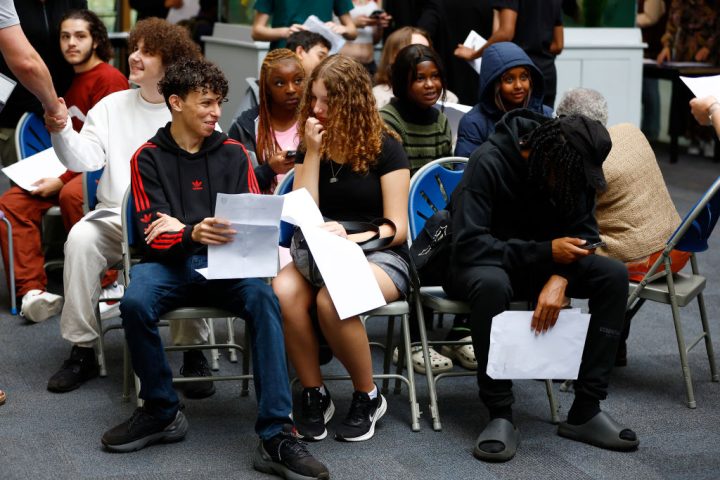This morning, students up and down across the country will anxiously open up their GCSE results, with local papers publishing photos of glowing over-achievers and other heartwarming success stories. The national media will, in all likelihood, focus on the number of top grades, and how this fits into recent trends concerning grade inflation as exam boards try to re-stabilise results post-Covid.
Yet this hyper-fixation on the number of 7s, 8s and 9s (the equivalent to an old-style A or A*) means we tend to overlook something much more important: the long tail of underachievement in England. We should be far less concerned by how many people do well at GCSE, and instead focus on the fact that, after twelve years of compulsory education, around 35 to 40 per cent of pupils still do not pass GCSE Maths or English.
You can’t just keep testing people to success.
This is a problem for lots of obvious reasons, but it has become a particular problem in recent years because the government has insisted that any pupil with a 3 or below in GCSE Maths or English Language must retake the subject until they pass. This means that hundreds of thousands of pupils are now doomed to a series of resits, which they are statistically less likely to pass every time. Last year, only 28 per cent of English resits were graded a 4 or above, whilst only 18 per cent of Maths resits were graded a pass; research by the Education Policy Institute suggests that most students only improve their score by a tenth of a grade, whilst disadvantaged and special educational needs (SEN) students on average go backwards or make no progress at all.
Certain cohorts are much more likely to be stuck in this vicious cycle of retakes than others: for example, pupils on free school meals (around 60 per cent); pupils with SEN (74 per cent); white and black pupils (36 and 40 per cent); boys (40 per cent, as compared with 32 per cent of girls); and children referred to social care (53 per cent). Most of these pupils who are re-taking will only have an hour or so of English or Maths lessons a week to help them catch up whilst they also try to concentrate on their post-16 studies. The dismal pass rate of these resits is proof enough of the inadequacy of this approach: you can’t just keep testing people to success.
This problem is also compounded by the recruitment problems facing Further Education colleges, where the vast majority of pupils take these resits. It is estimated that Further Education colleges need an extra 800 Maths and 400 English teachers just to teach the growing number of GCSE pupils, and yet the average college already has 30 unfilled teaching vacancies. Data from the Department for Education shows that, over the past decade, the rate of FE teachers leaving the profession has been significantly higher than for primary and secondary school teachers: over half of FE teachers who entered the profession in 2014/15 left the sector within five years. This inevitably means ever-larger class sizes for students who actually need the most support; Leeds City College, for example, had to grow some of its class sizes by 25 per cent to accommodate for the growing number of pupils retaking.
Students should be given the opportunity to retake if they wish, but it is educational madness to insist on doing the same thing over and over again and expect different results. Instead, we need to seriously consider why so many pupils are failing in the first place, which involves looking backwards as well as forwards: for example, research suggests that over half of pupils who fail GCSE English and Maths are already behind on their numeracy and literacy by age five. We also need to be brutally honest about the impact of bad behaviour: one survey suggests that schools lose on average a quarter of lesson time to misbehaviour and disruptive pupils, which is unacceptable given all the other challenges teachers face and the increasingly complex needs of classes.
We also need to look at serious alternatives for those who are not suited to a more academic path: for example, letting more students do Functional Skills Qualifications (FSQs) rather than GCSEs. Currently, students who get a level 3 in GCSE English or Maths cannot take FSQs, but research shows that some colleges take a blanket approach in which all students are entered into GCSEs, even if they received a level 2 or below. There are numerous potential reasons for this: GCSEs hold more weight with parents, employers and students; entering students into GCSEs provides more funding; and, because they are worth more than FSQs, they can also help deliver higher progress scores. However, all this does is create a demoralising culture of failure because students aren’t doing an appropriate course (by contrast, around three quarters of students pass their FSQs). Compulsory GCSE resits may sound like high expectations for all, but the reality looks very different indeed.







Comments